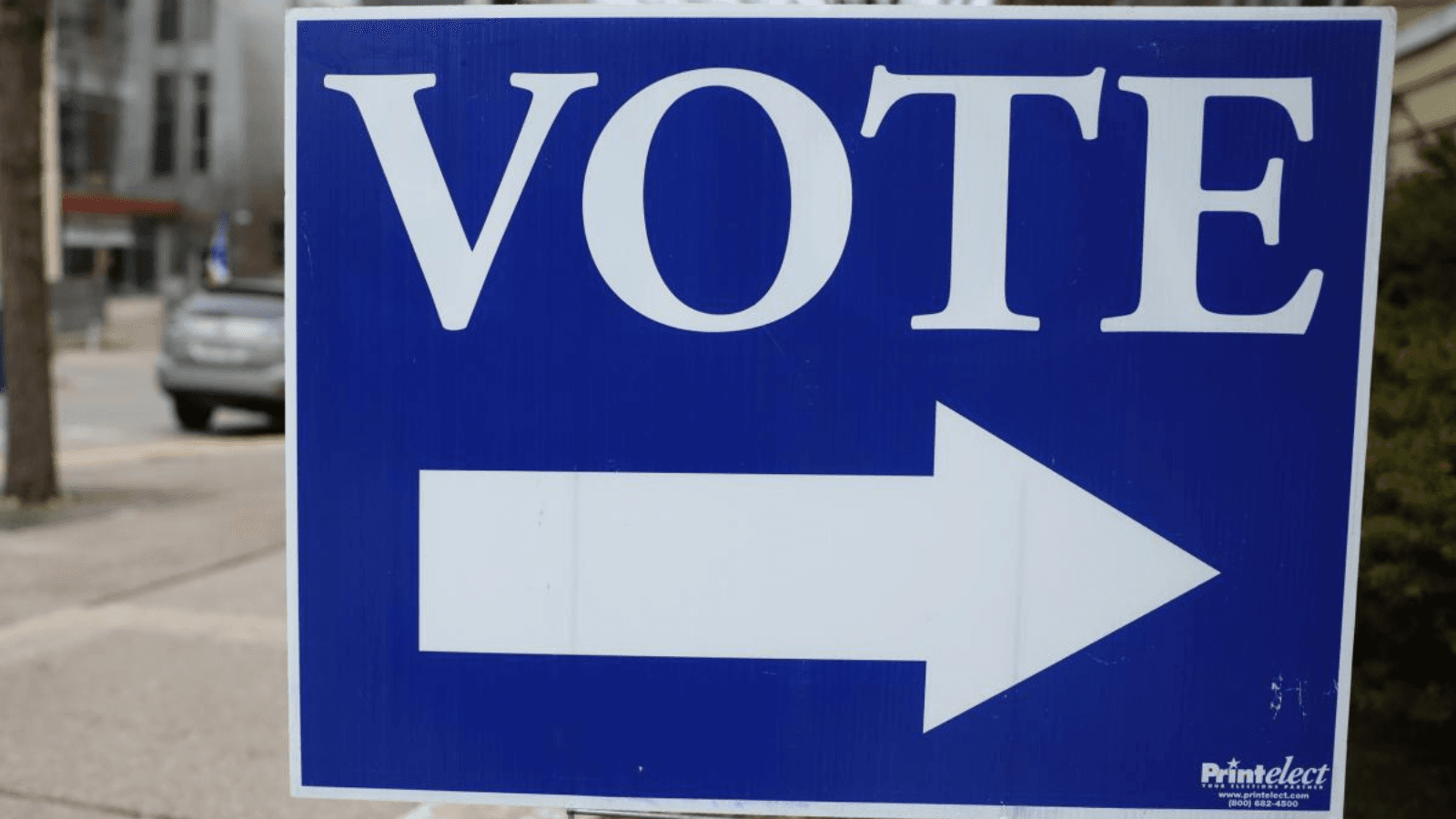
Source: Drake White-Bergey / Wisconsin Watch
Democrat seeks to flip GOP suburban Milwaukee seat with focus on abortion rights, tax cuts
Incumbent Sen. Duey Stroebel, R-Saukville, faces a challenge from Milwaukee Democrat Jodi Habush Sinykin. The race is a top target for Senate Democrats.
Wisconsin Watch is previewing legislative races in toss-up districts ahead of the Nov. 5 election by focusing on key issues for voters and what candidates say they will do to address them.

Abortion access, tax cuts and education funding are central issues in the race for Wisconsin Senate District 8 — a GOP-leaning toss-up district between Milwaukee and Port Washington that could help decide who controls the state Senate in the coming years.
The contest pits incumbent Sen. Duey Stroebel, R-Saukville, against environmental attorney and small business owner Jodi Habush Sinykin, a Democrat from Milwaukee. Stroebel has served in the Legislature since May 2011 and sits on its powerful budget-writing committee. Habush Sinykin previously ran for the state Senate in a special election in April 2023. She was narrowly defeated by Sen. Dan Knodl, R-Germantown.
The race is one of five Senate districts Democrats are targeting this cycle — hoping to tee themselves up to win a Senate majority in 2026 — and it’s the only flip opportunity in a district with a Republican incumbent, according to a Wisconsin Watch analysis of past voting patterns.
Still more than six weeks out from Election Day, groups on both sides are already running attack ads — an unusually early development for a state legislative race. New Wisconsin Majority is running a commercial attacking Stroebel’s opposition to abortion. Meanwhile, the Republican State Leadership Committee is running an ad blaming Democrats for increased costs that seeks to tie Habush Sinykin to Democratic lawmakers.
Here’s where both candidates stand on key issues in their district.
Abortion access
Habush Sinykin and Stroebel offer starkly different perspectives on what the state’s abortion laws should look like, according to an interview with the former and the latter’s work in the Legislature. Stroebel did not respond to multiple requests for an interview.
“Wisconsin’s abortion laws should very much reflect, as in any democracy, including Wisconsin’s democracy, the will of the people and the values of our people,” Habush Sinykin told Wisconsin Watch in an interview, pointing to polling from Marquette Law School that suggests between 60% and 70% of Wisconsin residents believe abortion should be legal in all or most cases.
New polling from the University of Maryland’s Program for Public Consultation also found that just shy of 80% of Wisconsin residents are against criminalizing the procedure before fetal viability in the state. That includes 57% of Republicans and 93% of Democrats. Criminalizing abortion was defined in the survey as “prison time or fines for the doctor or the woman.”
Habush Sinykin said reproductive freedom and health care access are the top issues she is hearing from voters when knocking on doors, especially from women. Voters have expressed concerns about restrictive abortion laws preventing them from accessing the health care providers they need, she said, with many doctors deciding not to practice in Wisconsin because of the state’s 1849 ban, which is currently unenforceable after a court order.
“To make women have to leave Wisconsin, or make us uncertain about the health care we can receive, it is just not OK,” Habush Sinykin said.

Stroebel joined all 21 of his Republican colleagues in the state Senate in June 2023 in voting against repealing Wisconsin’s 1849 abortion ban. Democrats attached the repeal provision to the state budget, forcing GOP lawmakers to vote on the issue. The 1849 law, which had been unenforceable because of Roe vs. Wade, was believed at the time to outlaw most abortions in the state. The 19th-century statute contains a vaguely defined exception for an abortion that is determined to be medically necessary to save the mother’s life, but does not make exceptions for cases of rape, incest or the mother’s health.
In April 2020, Stroebel introduced a constitutional amendment that would have guaranteed a fetus at every stage of development a “right to life.” During his Senate race in 2020, Stroebel was endorsed by Pro-Life Wisconsin, an organization that supports “candidates who recognize the personhood of the preborn baby and hold the principled and compassionate no-exceptions pro-life position.”

Taxes
Both candidates support cutting taxes, but largely for different groups.
“Strategic and intelligent tax cuts make sense for Wisconsin,” Habush Sinykin said.
As a business owner — she and her husband own a Janesville manufacturing company that produces paint rollers and other products — she said she has seen firsthand the “connection between our tax system and the ability to attract a strong workforce in Wisconsin.”
“We need Wisconsin to be able to keep and attract young families and a workforce,” Habush Sinykin said. She supports cutting taxes for middle class families while “ensuring that the highest earners pay their fair share,” according to her campaign policy platform.
“I very much think that we have to be competitive, not just in our region, but with the rest of the country, because that’s who we’re competing against,” she said.
Habush Sinykin said she would like to reduce taxes on Wisconsin seniors and retirees.
Too many people living on fixed incomes leave for other states with more favorable tax systems, Habush Sinykin said. She added that “Wisconsin can do far more to dissuade them from leaving the state.”
She declined to endorse a GOP-authored bill from the most recent legislative session that would have made retirement income for certain Wisconsin residents tax-free, but did say the proposal “certainly sounds to be a step in the right direction.” Habush Sinykin said she’d need to see the long-term financial implications for the state before endorsing any tax cut plan.
That plan would have raised the annual amount of tax-exempt withdrawals from a retirement account from $5,000 to $75,000 for single Wisconsin residents age 65 and older and up to $150,000 for joint filers. It was vetoed by Gov. Tony Evers, who said it would reduce revenue by $658 million in 2024-25 and $472 million in each subsequent fiscal year. Stroebel voted in favor of the legislation.
Stroebel has been a proponent of cutting taxes during his time in the Legislature. During the 2021-23 legislative session, he voted for reducing the state’s third-highest tax bracket from 6.27% to 5.3%, a $2 billion cut. That rate covers income between $27,630 and $304,170 for single filers and between $36,840 and $405,550 for joint filers.
During the most recent legislative session, Stroebel supported a number of tax cut provisions. He co-sponsored legislation that would have implemented a flat income tax system in Wisconsin by reducing income taxes for all filers to 3.25%. That proposal did not receive a vote in either the Senate or the Assembly.
Instead, during the most recent budget cycle, Stroebel backed a $3.5 billion income tax cut that would have focused its largest reductions on the state’s highest earners. The plan would have cut the top tax rate from 7.65% to 6.5% — a 15% reduction for high-earning joint filers who make $405,550 or more annually. It would have reduced the second-highest rate from 5.3% to 4.4%, a 17% decrease.
Evers vetoed those cuts from the budget but left in place reductions to the state’s bottom two brackets.
School funding
Habush Sinykin told Wisconsin Watch the state needs to be spending more on its public K-12 schools, noting that more and more districts around the state are turning to referendums to “maintain the quality and caliber of education that we have always been able to achieve in Wisconsin.”
U.S. Census Bureau data show that in 2022, Wisconsin’s per pupil spending was 7.21% lower than the national average. Wisconsin’s spending on schools ranked 25th among the 50 states in 2022, according to the data. That’s a drop from 11th in 2002 and 21st in 2012.
The state should kick in more for K-12 schools, Habush Sinykin said, to help address teacher shortages, reduce class sizes and improve education.
During the most recent legislative session, Stroebel sponsored a bill that increased funding for public K-12 schools by $1 billion. The funding was tied to $280 million in new funding for private voucher schools. Evers signed it.
The legislation helped close “the funding gap for private schools participating in the parental choice programs and gives parents more opportunities to decide which school best fits their child’s needs,” Stroebel said in a statement after the bill passed. “Wisconsin is making great strides towards establishing funding parity for all K-12 students with the passage of this piece of legislation.”
This article first appeared on Wisconsin Watch and is republished here under a Creative Commons license.![]()
Want More Local News?
Civic Media
Civic Media Inc.
The Civic Media App
Put us in your pocket.
